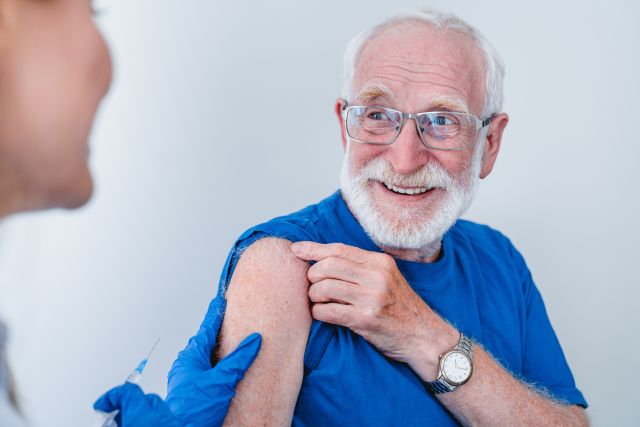Updated on November 9, 2023
One of the great pleasures of being a grandparent is visiting with the grandkids. But if you’re not taking care of your own health, you may be putting them in harm’s way. No matter what your age, it’s important to stay up to date on your vaccinations.
Getting immunized on a schedule you establish with your healthcare provider (HCP) may help you maintain your health and longevity, while also helping to protect your loved ones. Here are some key vaccine recommendations for older adults.
Whooping cough
You may not even know you have an illness that could be dangerous to your grandkids. This can be the case with whooping cough, also known as pertussis. Whooping cough is usually not a serious infection for adults, who tend develop an irritating cough for a few months. It can be deadly for children under age 1 however, as it may cause severe breathing difficulties.
The Tdap vaccine provides protection against whooping cough and two additional diseases—tetanus and diphtheria. It’s particularly important for anyone who’s going to be around babies to get a Tdap shot, since infants are especially vulnerable to infection.
If you’ve never had the Tdap vaccine or you’re due for a booster—adults should have Tdap or Td every 10 years—schedule an appointment with your HCP. To give the vaccine time to work, you’ll need to get it at least two weeks before you visit an unprotected child.
Flu
It’s not just grandparents and grandkids who need to get vaccinated for influenza—everyone should get a seasonal flu shot. The CDC recommends that people 6 months and older receive a flu vaccine each year. Much like Tdap, it’s vital to be immunized if you’ll be visiting a child younger than 6 months old.
Respiratory syncytial virus (RSV)
If you’re an adult aged 60 or older and an HCP recommends it, you should be vaccinated for RSV, a common infection with symptoms resembling a cold. Though most people recover from RSV within a week or two, babies and older adults are at higher risk of becoming severely ill and requiring hospitalization.
There are two available RSV vaccines available, both approved by the U.S. Food & Drug Administration in 2023. They’re administered in a single dose that you’ll receive just one time. It’s also recommended that pregnant people get the vaccine, or babies receive it directly.
Pneumonia
Pneumonia, an infection of the lungs that causes coughing and difficulty breathing, is the most common cause of death worldwide for children under age 5. But vaccines can help prevent serious complications. The CDC recommends that adults 65 or older and children younger than age 5 receive the pneumococcal vaccine, because people in both age groups are especially susceptible to pneumonia.
Shingles
Shingles is a painful skin rash that may also cause a headache, fever, and sometimes vision loss if the rash is near the eye. It develops in people who have previously had chickenpox. If you have active shingles, you may pass the virus to children via skin contact. Instead of shingles, though, they’ll get chickenpox.
To safeguard against shingles, adults age 50 years old and older should receive two doses of the Shingrix vaccine. If you received a shingles vaccine called Zostavax previous to 2020, you should return to get Shingrix, as it’s significantly more effective than Zostavax.
COVID-19
In the age of the COVID-19, it’s crucial to get vaccinated against the coronavirus. COVID-19 is known to be riskier for older adults, but it can also lead to serious complications in young children or people with a compromised immune system. It’s wise to get protected with the latest version of the vaccine or the appropriate booster as advised by your HCP.
Remember: When you take these important steps to protect your grandchildren, you—and the adults you’re close to—will also enjoy greater protection from disease and discomfort.





